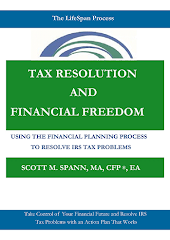The IRS and the Economic Policy Institute recently estimated the amount of taxes owed but not paid at $353 billion, equal to about 15% of the total taxes owed. These taxes not paid through our “voluntary and timely” system of taxation are often known as the “tax gap”.
Unpaid taxes mean that the average law abiding citizen is paying more than his or her fair share. If you are one of the millions that are not current with your taxes the tax gap has a different effect on you. The IRS is seeking to increase its collection efforts. Lawmakers will likely increase their pressure on the IRS to decrease the tax gap. Even with recent improvements the IRS is not moving fast enough in the eyes of many to improve the collection of back taxes. While the IRS recently acknowledged the need to be kinder and gentler in light of the recent financial crisis in our nation, they will not be as willing to deal with delinquent taxpayers that avoid collection efforts and ignore existing tax liabilities.
Congress and others are increasing their questioning of the effectiveness of the IRS collection processes. The IRS is currently implementing measures to improve its collection process. Currently, the IRS primarily focuses their collections efforts on a Three Phase Collection Process. Collection notices, phone calls, and in person visits are the three primary elements of the collection process. In 2007 the IRS sent 16 million collection letters to delinquent taxpayers. They answered 5.4 million incoming phone calls and made 1.9 million outgoing phone calls trying to collect on past due tax debt. In person visits are the final part of the IRS collection process. Over 400,000 contacts were made with delinquent taxpayers at their homes and businesses.
The IRS is constantly working to streamline its collection process. There are a number of reasons why IRS collection activities will continue to grow in the coming years:
• The struggling economy, growing national deficit, war on terrorism, and recent financial bailouts have created a situation where the government needs money badly.
• IRS collection efforts are needed and mandated by Congress to help close the tax gap.
• The IRS continues to hire new employees; the majority of these new hires focus on collections and enforcement activities.
• Budget increases are set to be spent on increased collections and enforcement.
• IRS Commissioner has stated that closing the tax gap is his number one priority.
The pressure on delinquent taxpayers will continue to increase as the federal government recently set in motion plans to increase its tax enforcement efforts in the coming years. In addition, new technology and information sharing among tax agencies make it easier for agencies to pinpoint potential offenders, increasing the number of cases for audit and collection. Tax and financial planning professionals are challenged with the task of helping their clients with tax liabilities resolve tax problems in the most cost-effective manner. A comprehensive plan that heavily emphasizes income tax planning can help individuals resolve their tax liabilities and accomplish other financial goals.
Monday, May 25, 2009
Friday, May 8, 2009
Filing Past Due Tax Returns
If you filed your tax returns on time the April 15th filing deadline may seem like a distant memory. However, if you filed an extension or missed the filing deadline, the idea of filing a past due tax return should be fresh in your mind.
If you have tax returns that need to be filed you are not alone. It is not uncommon for some taxpayers to go one or more years without filing a tax return. Many times I have seen that a taxpayer fails to file a tax return in a year when financial and life circumstances changed. For reasons related to procrastination, fear, lack of funds, or any other combination of factors a tax return was not filed. An amazing thing happens at first when a tax return is not filed within the system of voluntary compliance- Nothing! Sometimes weeks, months, and years may pass before the IRS requests a tax return or issues a tax assessment for a previous tax year.
Whatever the reason for not filing, tax problems only get worse if a non-compliant taxpayer starts worrying about his or her financial situation but does nothing to change the problem. Everyone has reasons and a life story that explains why a tax return was not filed. It is important to understand and address your individual reasons to avoid future filing problems. The tax resolution process is focused on the future and moving forward. Try to not dwell on your past mistakes or reasons for not filing a tax return. Focus on taking action and following the tax resolution steps.
Scott Spann
LifeSpan Tax Resolution
(877) TAX-9110
If you have tax returns that need to be filed you are not alone. It is not uncommon for some taxpayers to go one or more years without filing a tax return. Many times I have seen that a taxpayer fails to file a tax return in a year when financial and life circumstances changed. For reasons related to procrastination, fear, lack of funds, or any other combination of factors a tax return was not filed. An amazing thing happens at first when a tax return is not filed within the system of voluntary compliance- Nothing! Sometimes weeks, months, and years may pass before the IRS requests a tax return or issues a tax assessment for a previous tax year.
Whatever the reason for not filing, tax problems only get worse if a non-compliant taxpayer starts worrying about his or her financial situation but does nothing to change the problem. Everyone has reasons and a life story that explains why a tax return was not filed. It is important to understand and address your individual reasons to avoid future filing problems. The tax resolution process is focused on the future and moving forward. Try to not dwell on your past mistakes or reasons for not filing a tax return. Focus on taking action and following the tax resolution steps.
Scott Spann
LifeSpan Tax Resolution
(877) TAX-9110
Subscribe to:
Posts (Atom)




